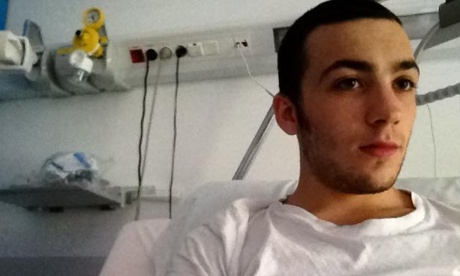
“Your cousin is dead.” My dad’s words stung as I entered the unusually gloomy kitchen one afternoon. Forty is no age to die and leave a 12-year-old daughter behind. My cousin’s death brought my own life-changing experience back to the surface. Two years ago, during my third year of university in March 2013, I was diagnosed with the same cancer that claimed her life.
I was diagnosed with a malign non-Hodgkin diffuse large B-cell lymphoma. Lymphomas are the most common cancers among 15- to 24-year-olds, representing 21% of diagnoses.
The news came as a shock. No one expects to be told they have cancer at 20; and my treatment would entail chemotherapy in France, where I’m from, which was incompatible with going to university and being with my girlfriend in the UK.
However, I didn’t want to give up. After having litres of cancer-killing chemicals injected into my bloodstream, I decided not to follow the haematologist’s advice and went back to the UK to try to live a normal life again. Unfortunately, the economics of travelling back and forth between France and the UK to finish the year became unrealistic.
Thankfully my university was supportive and understood that it wasn’t my fault that I missed my end-of-year exams. Staff at the university’s international office were really helpful. I felt they cared about me, which made me confident to share my problems, and I was able to take classes I’d missed in September and finish my degree by Christmas.
So I went back to France and thought of it as a gap year, or a long summer. It was challenging at times: getting my potentially cancerous tonsils removed and drinking nothing but cold soup for a week; and getting my testicles cut open to look for spermatozoon to freeze in case I want children in the future, as chemotherapy can affect fertility.
Chemotherapy even left me forever repulsed by almond croissants and Kinder chocolate. My mum brought these to the hospital on my first day of treatment, and the memory still makes me nauseous.
Meanwhile, I was looking through my hospital room window and imagining what I’d be doing if I hadn’t been diagnosed with cancer. I wanted to be going clubbing and worrying about university deadlines like a normal 20-year-old – not stuck indoors with a syringe in my arm.
My friends couldn’t have been more supportive. Some took time off work and university to do fun things with me, although we never really talked about my disease. Even when I ended up bleeding heavily after a skateboarding accident – chemotherapy weakens the scarring process – my friend found it amusing, which made it seem less serious.
Moreover, it made me realise who my real friends were – some said they’d visit me but didn’t. I understand they might just have been scared and not known how to react. I still see them now, but I don’t really value them as friends anymore.
Only my hairless scalp reminded me of my condition. I wore hats to hide it at first and feared my girlfriend would stop finding me attractive. I didn’t want to lose my life, but I also didn’t want to lose her. We’d met at university and she was my first serious girlfriend, but being separated by the English Channel for so long was difficult, and I feared she’d get bored.
Luckily she didn’t – we made sure we had Skype conversations every day and visited each other whenever possible. Eventually, when she finished university for the year, she came to stay with me at my parents’ house for the summer. We went to Paris and Rome on holiday to forget about my illness and we’re still together.
It would be a dishonest cliche to say I appreciate everything more now, because I still get mad at little things that used to irritate me. But I no longer take things for granted – like Stephen Sutton, I now view life in terms of achievements rather than time.
It’s been almost two years since I was given the all-clear and declared “in remission”. I resumed my studies and am now finishing a master’s. Before the experience, I thought I’d graduate, find a job, marry, have children and that would be it. Now I don’t think further ahead than the next check-up – I might relapse and my universe could crumble again.
Keep up with the latest on Guardian Students: follow us on Twitter at @GdnStudents – and become a member to receive exclusive benefits and our weekly newsletter.

